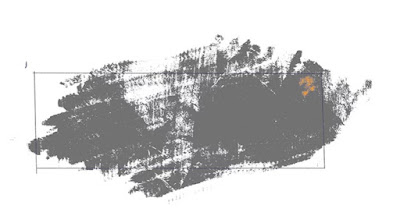BLUE DRESS WITH STRIPES
1.
A can of Diet Coke to cure a vicious hangover.
Or Star—her face in my mind,
superimposed over her later face,
the same face but how time moves across it.
The boy I loved that year who told me “You would be pretty
if only you didn’t move so much.”
A dress with blue stripes that didn’t suit.
A blue dress with stripes that made me look fat.
A blue dress with stripes that made me look small.
A blue dress with stripes that made me look as though I came from New Jersey.
A blue dress with stripes that gave me big hair
2.
1985 and our bodies terrified us—
Star and I, Michele and I, Lisa and I,
drinking egg creams and riding the subway to our dull jobs,
drinking vodka-and-tonics and roaming the night-streets in high heels
that cracked against jagged curbs or black oil on our bare feet.
3.
1985 and the accessories escape me:
Leopard vinyl strapped purses, flat plastic earrings in bold primary colors—mustard yellow,
fire-engine red, the royal blue of bleach. Black tubing braceleted around
our wrists, a tattoo of a purple flower.
A blue dress with stripes.
The F train to Coney Island where
we roamed the ruined Tunnel of Love, scrambling under police tape to pick our
way through red-cap, blue-cap crack bottles, and the surprise of the oily ocean.
4.
A blue dress that didn’t suit.
Our bodies that terrified us.
We covered them with glossy primary colors.
We used Eternity and Dove Extra Dry. We used Secret and
Patchouli. We used Vanilla Oil and Clorox. We used
Noxema and cider vinegar.
I left the boy who didn’t
want me to move. Michele got married. Lisa disappeared to
Los Angeles.
Star fell in love and moved in with
Stephen who did cocaine, Chris, who beat her when it was
himself he hated. Drugs, bad guys, more drugs. What she called
“having an oil burner habit.” Her roommate
Laura, who died in a tunnel under a bridge out in Marcy Avenue
in Brooklyn. Strangled. Put in plastic.
5.
A blue dress
with stripes
A blue dress with stripes
A blue ___ with ___.
6.
1985: Our bodies terrified us, but we had it the wrong way around:
Our bodies which placed us in simple danger
simply by being the bodies they were.
A dress with blue stripes.
The kind of dress that has shoulder pads,
and ruffles around the hips
The kind of dress that is made of some kind of woven plastic.
The kind of dress that would not disintegrate even in a landfill.
7.
Laura’s history
is not in any history books. She was missing for ten years and by
the time they found her, the guy who did it had been killed over
some other crime. My friend Star reported her missing to everyone
she could think of, but everyone in 1985 was not very interested.
8.
“He picked on girls who did drugs.”
“He killed three women and put them in a locked room inside the tunnel.”
“He had the key because he had worked for the MTA.”
“His job was maintenance & other things.”
9.
A blue dress
A blue
A dress
Stripes on the pavement. Stripes on a dress.
A blue dress with stripes abandoned in a closet.
10.
Star in a picture yesterday. Her
cheeks slightly hollow from missing teeth. A bird battered
on a window. You can blame the bird or you can blame the window,
but the grief is in the arrangement of these elements—how can the
bird not wish to fly onward, how can the window not exist?
11.
Who was there to tell us we would grow in the violet shade,
sunlight striped with shadow, stubbled with blue, with a violence underneath,
the drug of the blue dress with stripes
the drug of ruffles & ruffles.
And love, the drug of the wrong-headed stories
we told each other in 1985 when our bodies terrified us.
ABOUT THE POET
Sheila Black is the author of four poetry collections, most recently Iron, Ardent (Educe Press, 2017). She is a co-editor of Beauty is a Verb: The New Poetry of Disability (Cinco Puntos Press, 2011). Her poems have appeared in Poetry, The Spectacle, The Nation, The New York Times, and other places. She currently divides her time between San Antonio, TX, and Washington, D.C., where she works at AWP.
ABOUT SUGAR HOUSE REVIEW
We’ve loved reading the work that we’ve published (clearly), so now we want an opportunity to better hear our contributors. We will feature an audio recording of a poem from one of our seven issues, read by the poet and updated every couple of weeks. This an open invitation to all contributors from any of our issues, we were delighted to print your work, now we’re eager to hear it.

